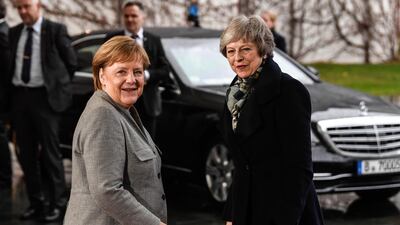Theresa May faces the greatest crisis of her turbulent time as British prime minister, with growing media reports that Conservative members of parliament were on the brink of forcing a confidence vote in her leadership.
On Tuesday evening, only one person knew for sure whether enough Tory members of Parliament had written letters demanding a vote to trigger one: Sir Graham Brady, the party official who receives them and needs to inform the prime minister when her job is indeed on the line.
"If she wanted to see me, I would of course make myself available," Mr Brady said. A source said that no meeting has been scheduled or sought.
_______________
Read more:
EU draws up no deal plans as UK's May heads to Brussels
Theresa May calls off crucial parliamentary vote on Brexit
Brexit Britain is in chaos and only a People's Vote can save it
Theresa May’s Brexit deal under fire as legal advice stiffens opposition
Sightline with Tim Marshall: What next for Brexit?
UK's Theresa May accused of misleading parliament
_______________
Mrs May’s office was only saying that they hadn’t been told that the threshold had been reached. In the absence of solid information, politicians swapped gossip about reports on the BBC and ITV that Mr Brady would be meeting Mrs May on Wednesday afternoon.
As the UK faced the prospect of more political uncertainty less than four months before it is due to leave the European Union, the pound fell to its lowest level against the dollar since April last year.
If the Conservatives do hold a confidence vote this week, it would take place while she’s meeting EU leaders in Brussels. If it were held back until next week, it would mean she would be negotiating without even knowing if she would still have a job after Christmas.
For those trying to remove Mrs May, there is risk as well.
Having struggled to get the 48 letters they needed to initiate the confidence vote, it's not clear if they will secure the much larger number that they need to remove her. There are 315 Conservative members of parliament and it takes a majority vote. If Mrs May wins, she can't be challenged for a year, giving her a little more space to negotiate Brexit as she chooses.
But in her efforts to politically survive the past few months, Mrs May has been burning up credit within her party. Every concession to one faction has upset another. Ministers have been sent out to news channels to defend a position, only for her to backpedal a few hours later.
For some, the final straw may have been the decision on Monday to pull the vote on her Brexit deal, when there is little prospect of winning the kinds of concessions from the EU that would be needed to get the deal through parliament.
With just about everyone in Parliament having begun to focus on what they wanted to do after May's deal was defeated, the delay to the vote has left MPs frustrated. Former environment secretary Owen Paterson – a Brexiteer – is a former Cabinet member who announced that he had put in a letter demanding a confidence vote.
Removing Mrs May wouldn't solve many of the party's problems. There is neither a candidate nor a Brexit position that its MPs can unite around. Any replacement would face the same impossible arithmetic in Parliament. The Tory party leans towards a harder Brexit – greater distance from the EU – but the centre of gravity in Parliament is for closer ties to the bloc.
Mrs May spent Tuesday on a whirlwind tour of Europe, trying to secure concessions from other leaders. She met German Chancellor Angela Merkel in Berlin, Dutch Prime Minister Mark Rutte in The Hague, and European Council President Donald Tusk and European Commission President Jean-Claude Juncker in Brussels. On Wednesday, she is due to face questions in Parliament at midday, then chair Cabinet, then fly to Dublin to meet Irish leader Leo Varadkar.
But that schedule could change, if Mr Brady says he has something to tell her.

